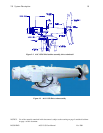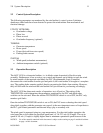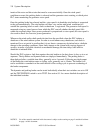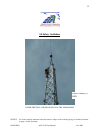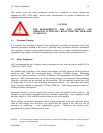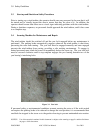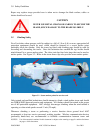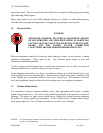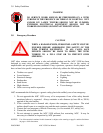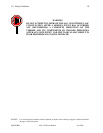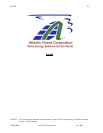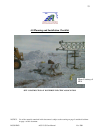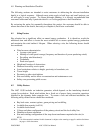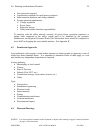
3.0 Safety Guidelines
NOTICE: Use of the material contained in this document is subject to the warning on page Iv and the disclaimer
on page v of this document.
DOC012R02 AOC 15/50 User Manual Nov 2001
18
WARNING
NO SERVICE WORK SHOULD BE PERFORMED ON A WIND
TURBINE IN THE PRESENCE OR THREAT OF LIGHTING. WET
AND/OR ICE LADEN TOWERS SHOULD NOT BE CLIMBED.
EXTERIOR ELECTRICAL EQUIPMENT SHOULD NOT BE
WORKED ON DURING SIGNIFICANT PRECIPITATION.
3.8 Emergency Procedure
CAUTION
WHEN A HAZARD EXISTS, PERSONNEL SAFETY MUST BE
ENSURED BEFORE ADDRESSING THE SAFETY OF THE
WIND TURBINE EQUIPMENT. IN ALL CASES, SAFE
EFFORTS SHOULD BE MADE TO BRING THE WIND
TURBINE TO A FULL STOP OR TO PREVENT OVER
SPEEDING.
AOC takes extreme care to design a safe and reliable product and the AOC 15/50 has been
designed to meet strict and extensive safety guidelines. However, due to the variety of
unpredictable and possibly extreme conditions it may experience, operators should prepare and
have on hand site-specific emergency procedures to effectively address the following hazards:
• Turbine over-speed
• Loose fasteners
• Structural damage
• Earthquakes
• Sand storms
• High vibration
• Cable over-wrap and/or separation
• Complete braking failure
• Electric fires
• Lighting
• Hurricanes
• Blade damage/separation
• Tower damage
AOC recommends the following as a generic safety plan in the unlikely case of an emergency:
1. Do not approach the AOC 15/50 or any of its components if one of the safety hazards
mentioned above is suspected. Always maintain a safe distance (at least 90 m, 300 ft)
upwind of the wind turbine.
2. If the controller area is deemed safe, depress the emergency stop button. The wind
turbine should come to a complete stop and the main contactor should de-energize.
3. Contact the local emergency officials if necessary (i.e. fire marshal, 911, utility, etc.).
4. Contact the wind turbine owner.
5. Do not attempt to operate the AOC 15/50 without first contacting AOC. It may be
necessary to schedule an inspection by AOC personnel.



